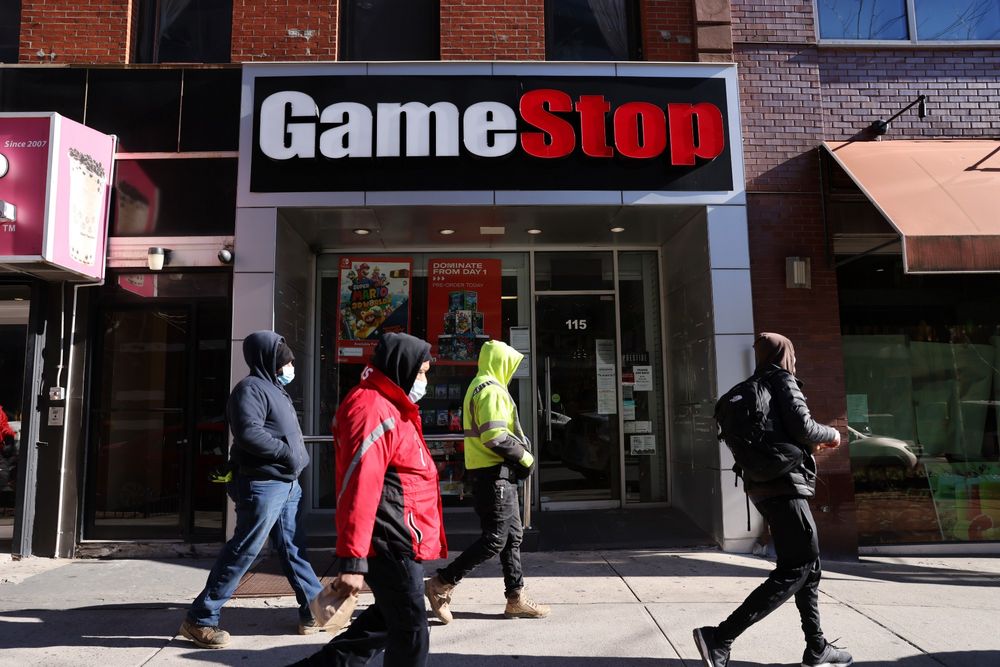“This is some bullst!” I said aloud to no one, as I watched a red dial draw circles on my iPhone screen before being replaced by a “Connection Error” message. It was Thursday morning, just after the stock market had opened for trading, and I’d lost count of how many times I’d attempted to purchase shares of stock in AMC Entertainment — yes, the struggling movie theater franchise — via Cash App, only for the requests to conk out. I knew these weren’t mere technical difficulties. There was some foul s**t going on.
As of the start of this week, AMC had become one of a handful of publicly traded entities known as “meme stocks” — holdings that have attracted the attention of hobby investors who congregate on platforms like Reddit and Discord. These companies typically have a cheap share price and low market value, making them attractive buys and prime for big profits. (And in many cases, major institutional investors had “shorted” the companies, betting major figures that their prices would fall over time.) GameStop is the most prominent of the batch, its stock price at one point shooting up by more than 1,900% since the start of this year, but other companies enjoyed big gains, too. Nokia; Blackberry; clothing retailer Express; even BB Liquidating, the last vestige of bankrupt video-rental company Blockbuster: It was a great time to be a relic from another decade.
As casual traders coordinated their efforts and encouraged each other to hold the line, their pet stocks skyrocketed — not only making money for them, but bringing crushing losses to the hedge funds and power players who had shorted those stocks. It was all perfectly legal, but the establishment pushed back. Around the same time that my Cash App stock purchases were being denied, word began to spread on social media that other brokerages had been halting buys of the aforementioned high-volatility stocks. Legacy firms like Charles Schwab and TD Ameritrade did it; mobile-first traders like WeBull did it. But perhaps most ironically, so did Robinhood, a user-friendly commission-free app that has prided itself on making investing more accessible for the everyday user.
The blowback was swift; investors of all backgrounds cried foul, claiming the game was rigged in favor of bigwig Wall Street players. Redditors had taken advantage of a loophole in the system — the same way large investment companies have done for decades, often at the expense of the average trader or overall market — and now they were being stock-blocked? As soon as the underclass began to get an edge, it seemed, the goalposts had been moved. Many of these eager investors rage posted their anger in all caps, aimed at a system that presents as impartial, but clearly favors those in power. People from across the ideological spectrum chimed in, voicing their support for the everyman investor. (“You know it’s been a WILD day when AOC, Ted Cruz, Donald Trump Jr. and Dave Portnoy all agree on something,” wrote one person on Twitter.)
I felt the same way. But I also couldn’t help but think about the thousands of White investors railing against a rigged system — investors who, maybe for the first time of their lives, were finally getting a sample-size taste of what systemic oppression feels like.
As these people swore against the influential forces and financial institutions, I wondered if they’d ever considered that this is a mere sliver of the Black experience in virtually every sphere of American life.
For many of these determined investors, inflating these stocks wasn’t just a money grab. On the subreddit Wall Street Bets, where much of the activity was centered, users celebrated toppling massive hedge funds like Melvin Capital. By running up the price of these stocks, these Reddit-roused investors were literally costing fat-cat Wall Street folks billions of dollars. This felt like David clocking Goliath in the domepiece. The redistribution of wealth that was unfolding was damn-near poetic.
After all of these stocks posted huge gains through the first half of the week — and the frenzy around the internet-powered middle finger to the man began to circulate — the powers that be stepped in. Robinhood restricted trading of the very stocks that had generated so much buzz online, citing an effort to protect the market and its investors. The brokerage only allowed people to sell their shares, not buy more, stalling the momentum and sending the prices toppling (the service resumed “limited” trading on Friday). It disallowed investors from capitalizing on a Wolf of Wall Street-level hysteria. And it pissed off a whole lot of White folks.
As these people swore against the influential forces and financial institutions, I wondered if they’d ever considered that this is a mere sliver of the Black experience in virtually every sphere of American life. This is what we feel every time we hear about another White entrepreneur making bank off of legalized marijuana — the same drug that has sent untold numbers of Black and Brown men to prison for possession charges. It’s how we feel seeing the opioid addiction that is primarily affecting White people in Middle America being treated as a crisis, while memories of the war on drugs that targeted Black folks during the crack epidemic are still fresh. It’s having to be twice as smart or skilled to get ahead of White counterparts, and still having to worry about crashing into some unforeseen obstacle or plummeting through a hidden trap door. I wondered how they felt.
Me? After repeated attempts, my Cash App purchase of AMC stock finally cleared. I was in the game. Perhaps it was just a congestion of orders that had held up the pipeline. Or maybe, just for once, it was the system working in my favor.
